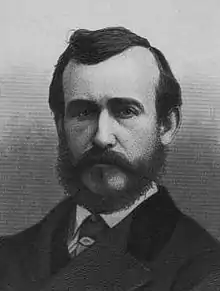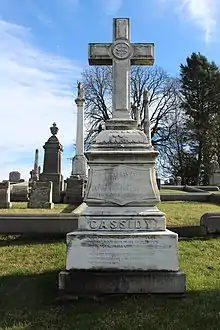Lewis C. Cassidy
Lewis Cochran Cassidy (October 17, 1829 – November 18, 1889) was an American lawyer and politician from Pennsylvania who served as Attorney General of Pennsylvania from 1883 to 1887.
Lewis Cochran Cassidy | |
|---|---|
 1874 engraving | |
| Attorney General of Pennsylvania | |
| In office January 17, 1883 – January 18, 1887 | |
| Governor | Robert E. Pattison |
| Preceded by | Henry W. Palmer |
| Succeeded by | William S. Kirkpatrick |
| Personal details | |
| Born | October 17, 1829 New York City, New York |
| Died | November 18, 1889 (aged 60) Germantown, Philadelphia, Pennsylvania |
| Resting place | Laurel Hill Cemetery, Philadelphia, Pennsylvania |
| Political party | Democratic |
| Spouse(s) | Sallie Truman[1] |
| Children | 3 |
Life and career
Cassidy was born in New York City, the child of Irish immigrants. The family moved to Philadelphia shortly afterwards. His father died when he was ten.[2]
Cassidy attended Central High. Upon graduating, he studied law in the offices of Benjamin H. Brewster, and was admitted to the bar in 1849. He was immediately successful, and proved popular with the Moyamensing Hose Company,[Note 1] and was elected to the state House for the 1851 term. In 1852, Cassidy was elected Solicitor for the District of Moyamensing. By 1856, Cassidy was already considered a local political boss, and his influence helped elect Richard Vaux city mayor. He himself ran for District Attorney against William B. Mann, originally winning and inducted into office, but later losing after a judge ruled for Mann.[3][4]
During the Civil War and afterwards, he was a staunch supporter of Union and federal coercion. He became a local leader of Democratic party politics. His support helped Robert E. Pattison become Governor—the state's only Democratic governor between the Civil War and the Great Depression—and Pattison in turn appointed Cassidy state Attorney General.[5]

Cassidy's wife died in the last year of his term.[1] At the completion of his term, Cassidy returned to private practice. He died in 1889, and was buried in Laurel Hill Cemetery.[6]
Legacy
The Lewis C. Cassidy School in Philadelphia was named after him.[7]
Notes
- After the 1844 riots, the local fire companies typically allied with ethnic street gangs and corrupted local politics (Wilson, Coval (n.d.))
Citations
- "Mrs. Cassidy's funeral". Pittsburgh Commercial Gazette. July 24, 1884. p. 1.
- "Cassidy" 1893, p. 32.
- "Cassidy" 1893, p. 33.
- McCaffery 2010, p. 15.
- "Cassidy" 1893, p. 34.
- "Funeral of Lewis C. Cassidy". The New York Times. Nov 22, 1889. p. 1.
- "Lewis C. Cassidy Academics Plus School". webgui.phila.k12.pa.us. School District of Philadelphia. Archived from the original on 2018-02-01. Retrieved 2015-05-20.
References
- Memorial of Hon. Lewis C. Cassidy. Allen, Lane & Scott. n.d.
- "Lewis C. Cassidy". Encyclopaedia of Contemporary Biography, of Pennsylvania. 3. Atlantic Publishing & Engraving Company. 1893. pp. 31–35.
- McCaffery, Peter (2010). When Bosses Ruled Philadelphia: The Emergence of the Republican Machine, 1867-1933. Penn State Press.
- Wilson, Kathryn; Coval, Jennifer (n.d.). "City of Unbrotherly Love: Violence in Nineteenth-Century Philadelphia" (PDF). hsp.org. Historical Society of Pennsylvania. Retrieved 2015-05-20.
| Legal offices | ||
|---|---|---|
| Preceded by Henry W. Palmer |
Pennsylvania Attorney General 1883–1887 |
Succeeded by William S. Kirkpatrick |
